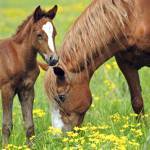Selenium for Broodmares and Foals

Like all horses, pregnant broodmares need an adequate intake of selenium, a mineral that is important for immune function. Selenium is transferred to the fetus through the placenta before birth and in mare’s milk after the foal is born.
In a study carried out at the University of Kentucky, different selenium sources and levels of dietary supplementation were evaluated to determine their effect on broodmares and their foals. Fifteen pregnant mares were blocked by foaling date and randomly assigned to one of three selenium supplements. Mares in the I1 group were given 1 mg selenium as sodium selenite, while mares in the I3 group were given 3 mg selenium as sodium selenite. Mares in the O3 group were given 3 mg selenium as selenium-enriched yeast.
The mares received their treatments daily for approximately eight weeks before foaling and eight weeks after foaling. Blood samples were taken from each mare prior to supplementation and at two-week intervals throughout the study, including at time of foaling. A single colostrum sample was taken from each mare prior to the foal suckling. Blood samples were obtained from foals at 12 hours after foaling and then at 2, 4, 6, and 8 weeks of age. Serum and colostrum samples were assayed for IgG concentration. Mares were weighed approximately a week prior to foaling. Mares and foals were weighed 12 hours after foaling, and at two-week intervals for about eight weeks.
Selenium amount or form did not affect colostrum IgG concentration or foal serum IgG concentration at 12 hours after birth. Mare IgG concentrations were not affected by treatment at four or two weeks before foaling or at the time of foaling. Failure of passive transfer occurred in two foals in treatment I3, and a third foal in this group did not complete the study. Consequently, serum IgG data from the remaining foals in group I3 and all foals in group O3 were combined and compared to foals in group I1.
Foals from mares receiving 3 mg selenium per day had higher concentrations of IgG at two, four, and eight weeks of age compared to foals from mares receiving I1. Average daily gain for all foals was 1.4 to 1.5 kg and was not affected by treatment. Placental weight and time to placental expulsion were not affected by selenium amount or form.
Results suggest that supplementing pregnant mares with 3 mg of selenium per day may be beneficial in increasing foal IgG concentrations during the first few months of life when foals are most vulnerable to disease.








